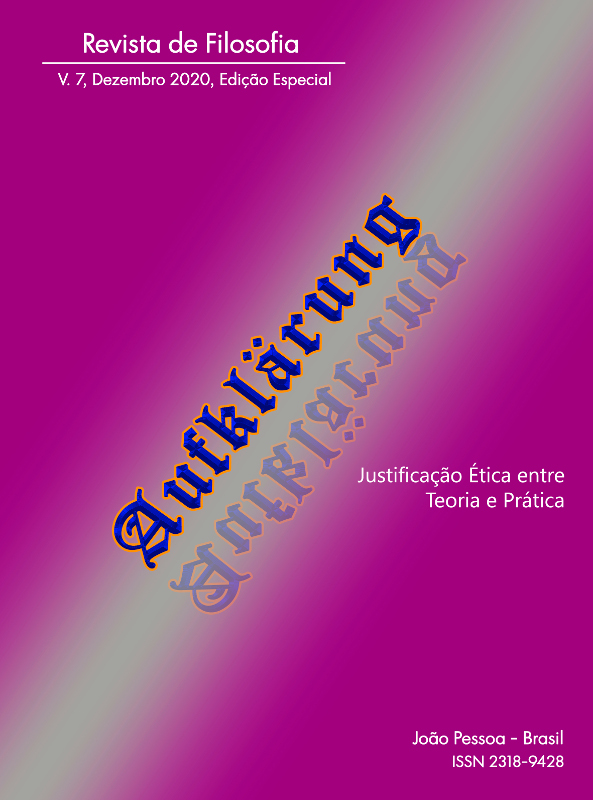Rethinking torture: A Foucauldian critique on justification of interrogational torture
DOI:
https://doi.org/10.18012/arf.v7iesp.55292Keywords:
Interrogational torture, Justification, BiopolitcsAbstract
Many jurists and politicians insist on justifying the use of torture. In this paper I will analyze the results of the detention and interrogation program of CIA, set up in 2002 to investigate and prevent future terrorist attacks. I will demonstrate, using Foucault's methodology for the analysis of power, that the use of large-scale torture, regardless of any justification, serves the purpose of imposing control over unsubmissive populations in complex political scenarios. My conclusions indicate the need to change the way we study the torture to, from a better understanding of the phenomenon, make decisions more efficient on how to fight it.
Downloads
References
AMNESTY INTERNATIONAL. Torture in 2014 – 30 Years of Broken Promises. Amnesty International, 2014.
ARRIGO, Jean Maria. A Utilitarian Argument Against Torture Interrogation of Terrorists. Science and Engineering Ethics, Volume 10, Issue 3, 2004.
ARRIGO, Jean Maria; BUFACCHI, Vittorio. Torture, Terrorism and the State: a Refutation of the Ticking-Bomb Argument. Journal of Applied Philosophy, Vol. 23, No. 3, 2006.
ARRIGO, Jean Maria. A Utilitarian Argument Against Torture Interrogation of Terrorists. Science and Engineering Ethics, Volume 10, Issue 3, 2004.
AUSSARESSES, Paul. The Battle of the Casbah: Terrorism and Counterterrorism in Algeria 1955–1957. New York: Enigma Books, 2002.
AUSSARESSES, Paul. Services speciaux Algerie 1955-1957 - Mon temoignage sur la torture. Paris/France: Éditions Perrins, 2001.
BAGARIC, Mirko; CLARKE, Julie. Torture - When the Unthinkable Is Morally Permissible. New York: State University of New York Press, 2007.
COHAN, John Alan. Torture and the Necessity Doctrine. 41 Val. U. L. Rev. 1587, 2007.
DAVIES, Jeremy. The Fireraisers: Bentham and Torture. 19: Interdisciplinary Studies in the Long Nineteenth Century, 15, 2012.
DERSHOWITZ, Alan M. Why Terrorism Works: Understanding the Threat, Responding to the Challenge. Yale University Press, 2002.
DERSHOWITZ, Alan M. The Torture Warrant – A response to Professor Strauss. New York Law School Law Review, v. 48, 2003.
DERSHOWITZ, Alan M. Is There a Right to Remain Silent? coercive interrogation and the fifth amendment after 9/11. Oxford: Oxford University Press, 2008.
FOUCAULT, Michel. Vigiar e punir. Petrópolis: Vozes, 2000.
FOUCAULT, Michel. Em defesa da sociedade. São Paulo: Martins Fontes, 2000.
FOUCAULT, Michel. Segurança. Território e população. São Paulo: Martins Fontes, 2008.
GREENBERG, Karen. DRATEL, Joshua L. The Torture Papers: The Road to Abu Ghraib. Cambridge University Press, 2005.
HUMAN RIGHTS WATCH. Torture and ill-treatment - Israel's Interrogation of Palestinians from the Occupied Territories. HRW/Middle East. United States of America, 1994.
LUBAN, David. Liberalism, Torture, and the Ticking Bomb. Virginia Law Review, 91, 1425-1461, 2005.
MARAN, R. Torture: The Role of Ideology in the French-Algerian War. New York: Praeger, 1989.
MATTHEWS, Richard. An Empirical Critique of “Interrogational” Torture. Journal of Social Philosophy, Vol. 43 No. 4, 457–470, Winter 2012.
OTTERMAN, Michael. American Torture. From the Cold War to Abu Ghraib and Beyond. Melbourne: Melbourne University Press, 2007.
PARRY, John T. Understanding torture - law, violence, and political identity. 2010.
POSNER, Eric; VERMEULE, Adrian. Should Coercive Interrogation Be Legal? 104 Michigan Law Review 671, 2006.
POSNER, Eric; VERMEULE, Adrian. Terror in the balance. Security, Liberty, and the Courts. Oxford University Press, 2007.
POSNER, Richard. “Not a Suicide Pact” – Constitution in a Time of National Emergency. Oxford University Press, 2006.
REJALI, Darius. Torture and Democracy. Princeton: Princeton University Press, 2007.
SCHIEMANN, John. W. Does Torture Work? New York: Oxford U. Press, 2016.
SCHIEMANN, John. Interrogational Torture: Or How Good Guys Get Bad Information with Ugly Methods. Political Research Quarterly 65(1) 3–19. University of Utah. DOI: 10.1177/1065912911430670, 2012.
SHUE, Henry. Torture in Dreamland: Disposing of the Ticking Bomb. Case Western Reserve Journal of International Law, v. 37, 2, 231, 2006.
SHUE, Henry. Torture. Philosophy & Public Affairs, Vol. 7, No. 2, pp. 124-143, 1978.
SONDEREGGER, Linus. Torture and the fight against terrorism. Crime Law Soc Change 62:337–353, 2014.
STRAUSS, Marcy. The Lessons of Abu Ghraib. Ohio St. Law Jnl, Vol. 66:1269, 2005.
STRAUSS, Marcy. Torture. New York Law School Law Review, vol. 48, 2003.
TINDALE, Christopher W. Tragic Choices: Reaffirming Absolutes in the Torture Debate. International Journal of Applied Philosophy 19:2. ISSN 0738-098X. pp. 209–222, 2005.
UN. Committee against Torture publishes findings on France, Tunisia, Saudi Arabia, Turkey, Philippines, Israel. 57 Session, 18 Apr 2016 - 13 May 2016.
UNITED STATES SENATE. Senate Select Committee on Intelligence. Committee Study of the Central Intelligence Agency's Detention and Interrogation Program. Findings and Conclusions, 2014.
USA. DEPARTMENT OF JUSTICE. Memorandum for William J. Haynes II. Application of Treaties and Laws to Al Qaeda and Taliban Detainees. January 9, 2002a.
USA. DEPARTMENT OF JUSTICE. Memorandum for The President. Application of The Geneva Conventions on The Prisoners of War to the Conflict with Al Qaeda and the Taliban. January 25, 2002b.
USA. DEPARTMENT OF JUSTICE. Memorandum for Alberto Gonzales. Standards of conduct for interrogation under 18 U.S.C. §§ 2340-2340A. August 1, 2002c.
WALDRON, Jeremy. Torture, Terror, and Trade-Off s - Philosophy for the White House. Oxford: Oxford University Press, 2010.
Additional Files
Published
How to Cite
Issue
Section
License
Journal general policy
1.This journal works under a Creative Commons License aplied to online journals. That icence can be read in the following link: Creative Commons Attribution 4.0 International (CC BY 4.0).
2.Accordingly to this License, a)the journal declares that authors hold the copyright of their articles without restrictions, and they can archieve them as post-print elsewhere. b)the journal allow the author(s) to retain publishing rights without restrictions.
Metadata Policy for information describing items in the repository
1. Anyone may access the metadata free of charge at anytime.
2.The metadata may be re-used in any medium without prior permission, even commercial purposes provided the OAI Identifier or a link to the original metadata record are given, under the terms of a CC BY license refered for the Journal.







































